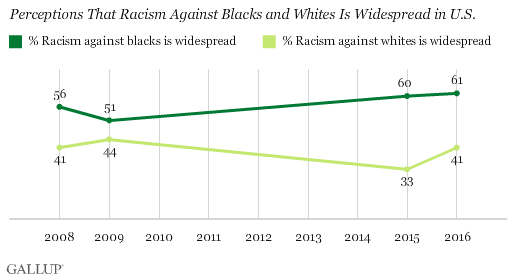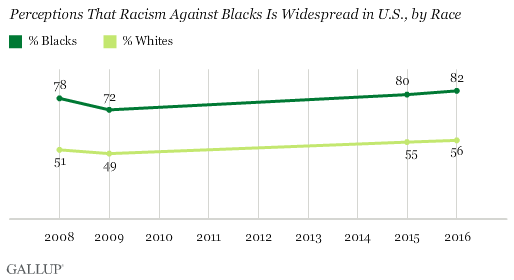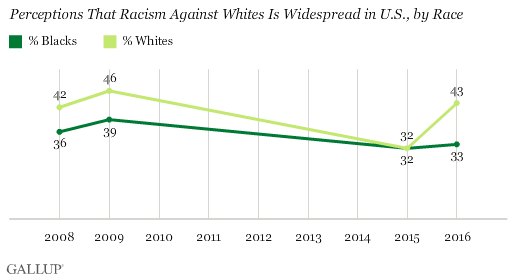Story Highlights
- Perceptions of racism against blacks remain elevated at 61%
- 41% say racism against whites is widespread, up from 2015
PRINCETON, N.J. -- Six in 10 Americans say racism against blacks is widespread in the U.S., similar to the percentage measured last year but higher than what Gallup found in 2008-2009, the most recent prior measures. At the same time, 41% say racism against whites is widespread, a return to previous levels after the measure dipped to 33% last year.

The latest results are based on Gallup's Minority Rights and Relations survey, conducted June 7-July 1 with 3,270 U.S. adults, including 1,320 non-Hispanic whites and 912 non-Hispanic blacks.
Americans' perceptions of widespread racism against blacks remain elevated this year after an uptick last year, likely in response to the highly publicized incidents in which black men were killed in confrontations with white police officers in 2014 and early 2015. The increase in perceptions of racism against blacks in 2015 was not as dramatic as the changes in Americans' assessments of black-white relations in last year's survey, for example, perhaps because the majority of Americans already thought racism was widespread.
There have been more recent deadly encounters between police and citizens this summer, including incidents in Dallas and Louisiana in which black men shot and killed white police officers, but those occurred after interviewing for the poll finished July 1.
Both blacks and whites are more likely to say racism against blacks is widespread today than they were in October 2009, during the first year of Barack Obama's presidency. Now, 82% of blacks and 56% of whites say racism against blacks is widespread, reflecting increases of 10 and seven percentage points, respectively.

At 66%, Hispanics are more likely than whites but less likely than blacks to perceive racism against blacks as widespread. That figure is up from 59% in 2008. Gallup did not report an estimate among Hispanics in its 2009 survey.
Whites More Likely Than Last Year to Perceive Racism Against Whites
Currently, 43% of whites and 33% of blacks believe racism against whites is widespread. For whites, that essentially marks a return to 2008-2009 levels after a sharp drop to 32% last year. The percentage of blacks who perceive widespread racism against whites also fell last year, from 39% to 32%, but has not increased this year. As a result, whites are once again more likely than blacks to believe racism against whites is common.

The trend on whites' opinions about racism against whites indicates 2015 was the unusual year. Perhaps the extensive news coverage of racial incidents, particularly those resulting in the deaths of black men, may have left the impression that racism in the U.S. was largely directed against blacks. Some whites may not have been as comfortable acknowledging racism toward whites against that backdrop. In the second half of 2015 and first half of 2016, relatively few deadly incidents between white police and blacks occurred, which could have made those incidents less of a factor this year in how white Americans assess racism against whites.
Hispanics' views are similar to those of whites -- 42% of Hispanics believe racism against whites is widespread in the country.
Implications
Perceptions of racism against U.S. blacks were already high before several deadly confrontations between police and black citizens in 2014 and 2015 led to increased concerns about race relations in the U.S., but they have increased modestly since then. At the same time, Americans' belief in equality of opportunity for blacks in being able to find good jobs, a quality education, and any housing they can afford are the lowest they have been since at least the 1990s. These trends underscore that Americans perceive the situation for blacks as worse than it has been in the recent past.
Those heightened perceptions of racism could reflect the reality that racism is greater in the U.S. It is also possible that the actual prevalence of racism is unchanged but is perceived to be greater because of the increased news media attention devoted to matters of race. After the 2014-2015 police incidents, there was little change in blacks' self-reports of being treated unfairly in a variety of situations, including in dealings with police. This year's update continues to show between 12% and 25% of blacks reporting they have been treated unfairly in their dealings with police, while they are at work, while shopping or in other situations. Thus, while the problem of racism may be receiving greater or at least renewed attention, and deservedly so, it is unclear if the problem is actually worse than it was a few years ago.
Historical data are available in Gallup Analytics.
Survey Methods
Results for this Gallup poll are based on telephone interviews conducted June 7-July 1, 2016, with a sample of 3,270 adults, aged 18 and older, living in all 50 U.S. states and the District of Columbia, who had previously been interviewed in the Gallup Daily tracking poll and agreed to be re-interviewed for a later study. The sample is weighted to be representative of U.S. adults.
For results based on the total sample of national adults, the margin of sampling error is ±3 percentage points at the 95% confidence level. For results based on the sample of 1,320 non-Hispanic whites, the margin of sampling error is ±4 percentage points at the 95% confidence level. For results based on the sample of 912 non-Hispanic blacks, the margin of sampling error is ±5 percentage points at the 95% confidence level. For results based on the sample of 906 Hispanics, the margin of sampling error is ±6 percentage points at the 95% confidence level.
All reported margins of sampling error include computed design effects for weighting.
View survey methodology, complete question responses and trends.
Learn more about how the Gallup Poll Social Series works.

